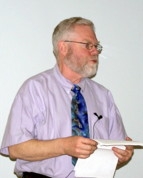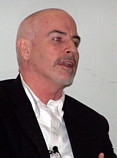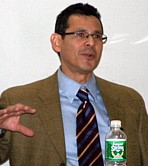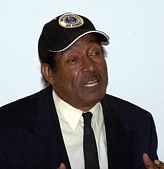|
Conference
Report:
COLUMBIA
UNIVERSITY
Mailman
School of Public Health
Queer
Health Task Force
The Camouflage Closet:
Health and Policy Issues For Queers in Uniform DADT
affects the healthcare of gay service members
and veterans New York, NY; by Denny Meyer
On April 13th 2007, the first university
conference on Health and Policy issues for
lesbian, gay, bisexual, and transgender American
military service members and veterans affected
by the Don't Ask Don't Tell law (DADT) was
presented by the Queer Health Task Force at
Columbia University's Malman School of Public
Health. The conference explored the
interface between treatment and policy relating
to Post Traumatic Stress Disorder (PTSD),
as well as other unintended health treatment
consequences of the DADT law affecting gay service
members and veterans. Speakers
included a psychologist and a psychiatric nurse
working with gay veterans, a veteran nurse and
former officer, a
minority gay veteran, and a gay
veteran public policy advocate. Some of
the conclusions revealed during the conference
were:
-Don't
Ask Don't Tell prevents partner visits to
wounded gay soldiers
-Having to hide sexual orientation in service to
nation can result in long term PTSD
-The discriminatory policy induces a sense of
shame and leads to low self-esteem
-Treating
social stigma and isolation caused by DADT
policy is a Public Health Issue
-For minorities, the discrimination against gays
serving their country is all too familiar.
|

|
John
Pulhamus,
a nurse and former naval officer, who was
discharged due to homosexuality, began with an overview of
events and advances that affected the health and
integration of servicemembers in recent
history. Until the most recent conflicts,
there was a very high death rate among wounded
combatants in the Spanish-American War and World
Wars I and II. Starting with Vietnam and
in the current wars there have been a high rate of
wounded survivors who must deal with mental
health issues such as PTSD and the disclosure
issues resulting from the need for partner
participation in healing. |
He
noted, also, that it was General Pershing who
conceived of the idea of 'open bay living' for
enlisted personnel so that there was very little
possibility for servicemembers to have any sort
of privacy or choice in the matter of whom they
shared personal activity and space with.
(In the matter of prosecuting 'undesirable'
behavior, it was not until WWII that the UCMJ
article 125 criminalized sodomy for those in
uniform, he noted). HIV
Screening, discharges, and suicides:
In
the 1980s, when AIDS tests were created, the
armed forces began screening all personnel for
HIV and at first simply discharged those with a
positive result, denying them any healthcare or
counseling. This resulted in a number of
preventable suicides at that time, according to
Mr. Pulhamus, who was co-founder of People With
Aids Coalition of Jacksonville, Fl. DADT
prevents partner visits to wounded gay soldiers:
In
the current war in Iraq, Mr. Pulhamus pointed
out, same-sex partners are denied the ease of
communicating with each other openly, while
their heterosexual fellow servicemembers have
that privilege,
which contributes greatly to alleviating the
mental stressors of living in a combat zone far
from home. When gravely injured and
struggling to survive, gay servicemembers need
the same support from their partners that
heterosexuals have. While the military
community makes every effort to bring spouses
and family to the injured with travel and
housing assistance, a gay partner must remain
hidden and cannot come to the hospital without
risking an investigation into the
relationship. This lack of social support exacerbates the mental
injury and slows recovery resulting from
physical pain and maiming. Hence, despite
the medical advances in healing injured
soldiers, gay servicemembers suffer inordinately
because of the restrictions resulting from the
DADT policy that prevent them from normal and
open access to those who care about them.
 |
Kevin
O'Brien, PhD,
LCSW, a Vet Center Team Leader, described the
creation of Vet Centers, after the Vietnam war,
which were designed to work within local
communities to reach out to serve the needs of
Vietnam veterans who felt alienated from the
government and society as a whole. "Many
of these veterans were not making use of VA
hospitals, and health services, and this was
significantly impeding their ability to
successfully re-adjust following combat.
Some of these veterans included the
disenfranchised, homeless, substance abusers,
and socially dysfunctional individuals that were
not able to emotionally "come
home." |
The more informal atmosphere
of the Vet Centers enabled outreach and
treatment to these and other veterans who
were not comfortable in the clinical
setting of VA hospitals. The latter
group included, minorities and among them were
veterans who happened to be LGBT
veterans," he explained. Dr. O'Brien
has found that many LGBT veterans were not aware
that they were eligible for healthcare at VA
hospitals. This led to increased outreach
efforts on his part and that of others within VA
and Vet Centers to increase awareness that DADT
should not impact the delivery of healthcare
services within VA. "In the past many veterans
feared rejection and loss of benefits
if they were to disclose their orientation
during routine hospital treatment, and even
during PTSD and other mental health
treatment. This is a major health issue,
and a direct consequence of policies banning
homosexuals, and treating them as
subversive. Veterans, all veterans, should
be free to discuss any and all issues impacting
their daily lives, including whom they sleep
with, without fear of reprisal or discrimination," he said. It has been
Dr. O'Brien's experience that veterans need
not hide or feel secretive about their personal,
emotional, sexual, and medical concerns.
"Regardless of persuasion, race, or gender
a veteran is veteran, and his welfare must come
above all else."
Having
to hide sexual orientation in service to nation
can result in long-term PTSD:
Of those gay servicemembers who had to hide
their sexual orientation while serving in
combat in Vietnam that developed PTSD, some
had significant readjustment problems as a
result. "This is primarily due to the
lack of social supports, within military, and in
the veteran population at large. Very few
gay and lesbian veterans are active and open in
their local American Legion, or VFW. Many
are alienated from their heterosexual
counterparts, families, and rely on the LGBT
community and connections they make."
Dr. O'Brien said that he believes that countless
LGBT combat veterans' issues have gone
unattended, and many may have succumbed to
substance abuse, or subsequent suicide as a
result of the societal ostracism.
For older gay
veterans, this sense of isolation is also made
worse by the lifelong fear of closeted persons
of being "outed," and possibly fired
in civilian life. "This is a constant
in every LGBT individual's life, regardless of
military service however, as a result of DADT,
and the previous wording in the ban on
homosexuals, experience the intrusive thoughts,
and fears they felt during their military
careers of being systematically humiliated and
dishonorably discharged if "outed." Those
who were discovered to be LGBT, and in
violation of the ban on homosexuals that have
been in place since World War II that were
dishonorably discharged, tended to have much lower
levels of employment and additional adverse
effects on their post-military readjustment. Following
a lifelong sense of societal isolation, shame,
and humiliation some of these veterans are now
finding their way into treatment at Vet Centers."
One individual Dr. O'Brien worked with came in
seeking a discharge upgrade more than 50 years
after being coerced into a dishonorable
discharge for being a homosexual. Some 40,
or 50 years after their service, veterans
are finally coming to Vet Centers seeking
help in getting a discharge upgrade in
order to be eligible for medical benefits which
they desperately need at age 50 - 60, having no
other health benefits due to their lifetime of
under-employment.
Many of these
gay veterans, according to Dr. O'Brien, lacked
the social camaraderie of traditional veterans
associations and moreover often were also alienated
from their families. "As a
result of this lack of normal support
networks, many gay Vietnam veterans never
successfully reintegrated into society and
civilian life after their service. Such
gay veterans were frequently found to have
low self esteem and unable to fully appreciate
their valued contributions as service men and
women." Although the Veterans
Administration does not discriminate,
according to Dr. O'Brien, many gay veterans
believe that it does based on their experience
while in the military, and consequently have
stayed away and never got treated following
their service. The Vet
Center multi-cultural outreach program,
which he and others have pioneered, tries to
overcome this problem and brings in
families and significant others of all groups,
including LGBT veterans and partners for groups
and other comprehensive and inclusive
treatment modalities.
What these
treatment sessions have revealed is that gay
service members on active duty, particularly in
a combat zone have had a constant fear of
being outed, fragging (intentional
'friendly fire'), and harassment. More
recent gay veterans have been more openly
accepted within their command units and thus
felt more assimilated and integrated than
in previous combat situations. However,
the homophobia from the top of the chain of
command down has remained unchanged
administratively. The
discriminatory policy induces a sense of shame
and leads to low self esteem: Treatment sessions with
veterans have revealed that
gay servicemembers suffer from a unique
situation brought on by a policy that requires
them to hide their orientation and keep a constant
secret while constantly hearing homophobic
policy that says that they are unfit, unwanted, and
unsuitable for the service they have devoted
themselves to. The constant, repeated,
implied shame has led to lifelong low self
esteem, affecting employment, relationships,
lifestyle, and healthcare avoidance that
continues into old age.
"Let's not let this current
generation of LGBT veterans suffer the same
fate," he concluded.
 |
John
Tatarakis, MS,
MPH, a Psychiatiric / Mental Health Clinical
Nurse Specialist and Patient Care Team
Coordinator, has dealt with two distinct groups
of veterans requiring mental health treatment in
the aftermath of their military service: Those
in their 20s and 30s currently transitioning
back to civilian life and suffering social
dysfunction; and those from ages 50 to 88
suffering long-term problems long after their
service. |
Treating
social stigma and isolation caused by DADT
policy is a Public Health Issue: Older
gay veterans have been found to have the least
social support. During their military
service, in their youth, they learned to
compartmentalize the segments of their life in
order to hide their gay identity. This led to a
lifetime of compartmentalization resulting in
the failure of developing a social support
network. In older age and ill, never
having belonged to traditional veterans'
associations, they were unaware that they could
get healthcare from the VA. In
treatment groups for older gay vets run by Mr.
Tatarakis, these vets for the first time in
their long lives have begun to see their long-ago service as having been honorable and that
they therefore deserve the same healthcare
treatment as other veterans for their
illnesses. In these groups, older gay vets
have been able to talk openly for the first time
with others who have had the same
experience. And thereby their long-delayed
post-combat service re-socialization begins when
they form bonds and a support group of their own
in which they feel understood for the first time
by those with a shared experience. While
in the military, these vets had never been able
to get close to their peers and form the normal
supportive bonds because they feared saying too
much and being outed. In later
years, many had become further isolated
due to the loss of close friends to AIDS. Now,
via these groups, forty or more years after
their service, they at last find peers with whom
to form a support network. For
many of these stoic older gay veterans, the
symptoms of PTSD, which originated in their
combat service, did not emerge until after their
retirement decades later, after they lost those
close to them to AIDS, and found themselves
isolated, ill, and in need. They had no idea
that they could turn to the VA for assistance
and treatment because they believed that the VA
did not treat their issues and that they would
be discriminated against. Hence, there is
a long-term public health issue that has
resulted from the ban on gays serving in the
military, which evolved into the current
Don't Ask Don't Tell policy, which perpetuates
the social stigma and isolation of these proud
patriotic volunteers.
 |
Ray
Chism, a
Vietnam-Era veteran, described his experience as
a gay Black man in the service and as a
veteran. He had enlisted in the Air Force
at age 20 and served four years. He
immediately realized that he had to
compartmentalize his life and suffered ongoing
stress from having to constantly be
careful. He knew that if he were known to
go to gay areas he would be court martialed.
So he devoted his efforts, successfully, to
"keeping my nose clean," and completed
his duty with an honorable discharge and got the
benefits he deserved. |
Later,
he moved to New York City to care for his ill
uncle and joined the Army Reserve. During
the course of that second service, his living
arrangement with his uncle was questioned and
investigated. In the end, he was denied
the opportunity to reenlist and was given a
'Less Than Honorable' discharge. "The
USAR stuck it to me," he said, speaking
freely at last. For
minorities, the discrimination against gays
serving their country is all too familiar: "My
service was as honorable as any other
reservist's," Mr. Chism told us, speaking
out at last after what he said had been a life
of secretive stress and fear of being harmed
because of who he is. "Being gay is
no different than being left handed. And
discrimination is no different whether you are
gay, or Black or both." His
experience as a Black veteran, he said, made him
very aware that America does not uphold the
principles of our constitution, the relevant
passage of which he quoted from memory.
"The pursuit of happiness," he said,
includes the right to be able to live freely
with his partner without fear of
discrimination. Until Americans see gay
people as normal as being right handed, the hate
and hurt will continue. In his experience,
"the world has not changed very much, but
it is changing" ever so slowly. He
urged the university students to carry on
changing the world.
The
conference was organized by public health
students including Adrian Guzman, Todd Sekuler,
Alison Lin, Molly Franks, Andrea Sifferman, Kate
Jerman, and Alexa Prussin. Assistant Professor
Miguel Munoz-Laboy also helped to facilitate a
final discussion on the role of public health
professionals in serving the needs of invisible
and marginalized populations.
|